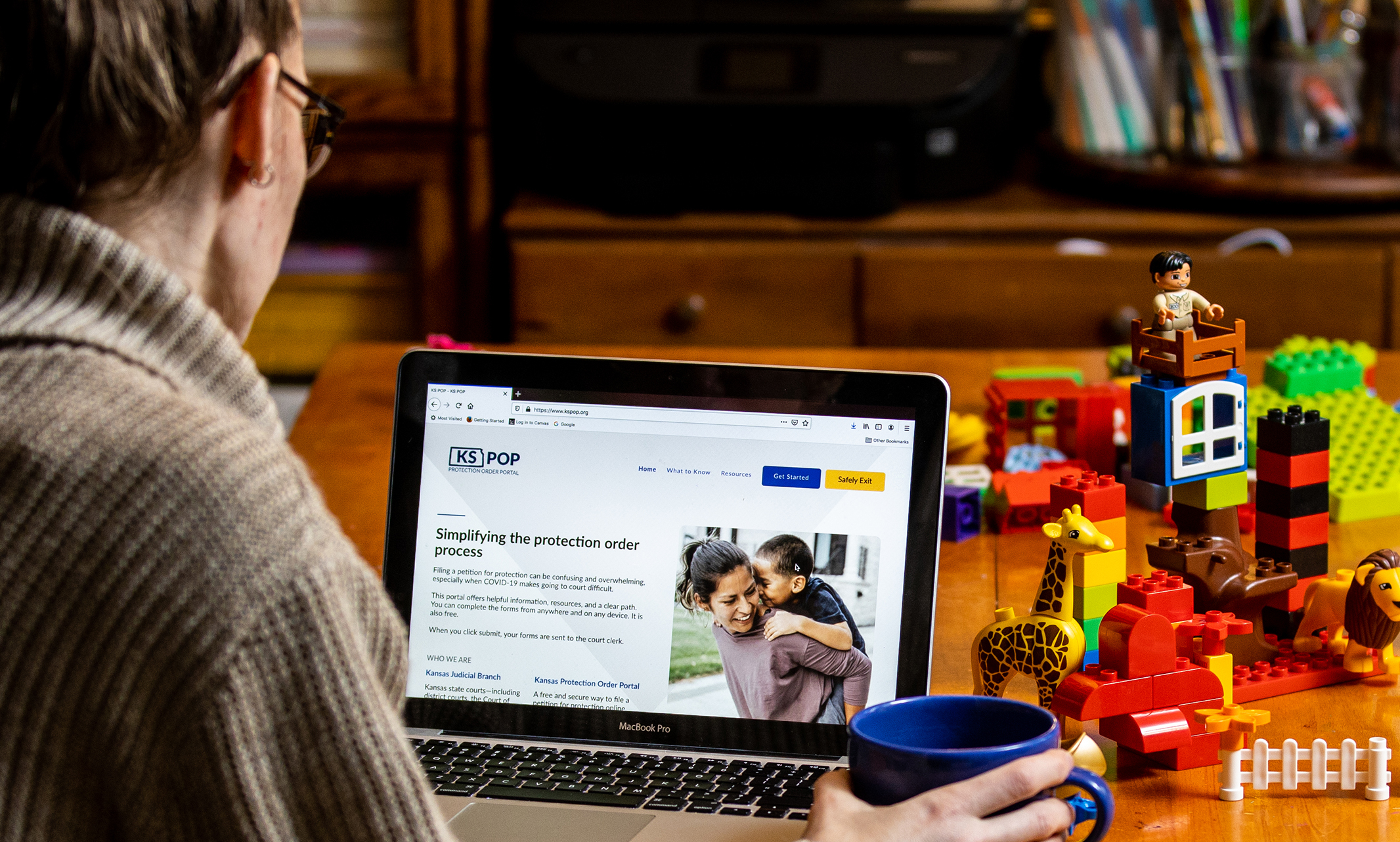This story originally appeared in Res Ipsa, the UMKC School of Law alumni magazine. To learn more, read the full issue or visit the School of Law website.
Before COVID-19 changed everything, Kansas court officials knew they needed to change how victims of domestic abuse and sexual assault applied for court-ordered protection in the state.
Johnson County District Court Judge Keven M.P. O’Grady says the process of seeking an Order of Protection in Kansas was time consuming. Before a judge could consider a request, vulnerable applicants had to wade through pages of legalese-filled paperwork and file it in person with a county clerk.
“It was quite a process,” O’Grady says. “It was not uncommon for people to need two, three, four hours.”
But when a worldwide pandemic shut down courthouses across the state last spring, filing in person was no longer an option. Making updates to the Order of Protection system moved from necessary to imperative on the state judiciary’s priority list.
Partnering to Protect Kansans
O’Grady had already been in discussions with the UMKC School of Law about using technology to make the process easier. Once courthouses closed down, the project moved to a fast track.
“We were really worried about victims of domestic violence having access,” says O’Grady.
Using federal COVID-19 grant funding, the Kansas court system contracted with the Law School to develop an online filing system. Instead of having applicants print out forms and deliver them in person, the state wanted to allow victims to seek help through a computer or smartphone. And, perhaps most importantly, the entire process needed to be easy to understand.
The result, to be rolled out across the state by the end of February, is the Kansas Protection Order Portal, or KS POP. It is already up and running in Johnson, Riley and Harvey counties.
“Now people don’t even need to go to a clerk” to file a petition, says Staci Pratt, who serves as director of public services at the Leon E. Bloch Law Library and oversees the school’s self-help clinic. “I think that’s fundamental to creating equal access to justice before the law.”
In plain language, the KS POP explains exactly who is eligible for a protection order and what it takes to apply. The site also gives information about locally available advocates who can support a victim through the process.
If victims decide to move forward, KS POP takes them through a simple, guided interview. They answer questions, and the portal uses that information to populate a form, which is then submitted to the proper county court jurisdiction.
Last fall, as a small team at the Law School went to work on designing the portal, it quickly became clear that creating the computer platform to support the system wasn’t the hard part, says Ayyoub Ajmi, associate director and digital communication and learning initiatives librarian at the Leon E. Bloch Law Library.
Among other things, the Law School had to convince different jurisdictions to accept the common form that the portal generates based on interview questions. The portal also needed to identify a victim’s individual circumstances, which could require varying information.
Andrew Watts (J.D. ’20), a recent UMKC Law graduate who worked on the project for three months as a Truman Fellow, says it was important to understand exactly what information jurisdictions needed to move ahead with a petition, while also making the questions as clear as possible.
“One of the goals was to simplify the process completely,” he says.
So far, that effort to simplify things has greatly reduced the amount of time required to file a petition, literally trimming hours from the process. What may have taken an entire day could now be completed in less than an hour, Ajmi says.
Making Safety a Priority
While making the process simpler was one goal, portal designers also knew they needed to take great care to make sure that vulnerable victims using the portal remained safe. For this reason, the site features a single button that a victim can touch to immediately exit the portal if they fear being detected by their abuser. And every step of the way, the KS POP provides users with information about local advocates available to help them on the ground in their community.
Marilyn Harp, executive director of Kansas Legal Services, says having that information is vital, since most victims benefit from having an advocate at their side to navigate legal and safety consequences that will arise with going to court.
The convenience the portal affords is good news for Kansans facing domestic or sexual abuse, Harp says. But survivors should know that getting an advocate’s assistance is still an important part of the process.
Often the most dangerous time for a survivor is when they leave their abuser, Harp says. Having an advocate who can help think through consequences and safety procedures can be critical. Harp thanked the UMKC team for clearly conveying that message through the portal.

